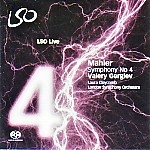This is bad. The LSO, interestingly, despite its advocacy of Mahler over the years, has not been known for its performances of the Fourth–but there’s really nothing wrong with the orchestra here, which plays for the most part very well. No, the problems all stem from the podium. Gergiev simply hasn’t a clue about how this music should go, and his interpretation, if one could call it that, doesn’t even have the virtue of being grotesque. It’s just flat and, well, wrong.
Start at the beginning with the first movement exposition. The first subject is lethargic, the romantic second theme rushed and bereft of lyrical intensity, and the closing theme for woodwinds stiff and charmless. Given these parameters, the remainder of the movement falls apart; it’s as if Gergiev is conducting his own fantasia on themes from Mahler’s Fourth Symphony, with little regard for establishing any continuity between them. The scherzo, on the other hand, is rhythmically rigid, the magical interlude in the second trio, with its theoretically luscious string glissandos, criminally underplayed. In these circumstances some fine work from the solo violin, horn, and winds goes for naught.
The adagio is simply vile, taken at a very rapid clip (less than 19 minutes), which isn’t terrible by itself–Klemperer conducts it similarly–but once again its various elements are out of proportion. The slow bits move swiftly, while the more passionate second theme rushes by with little power at the climaxes. At this speed, the accelerating variations before the big climax have insufficient room to accelerate, and where is their humor (the muted trumpet run just before the madcap climax, for example)? The entire movement lacks repose where Mahler asks for it, and contrast everywhere else.
As for the finale, Soprano Laura Claycomb sings quite well, but once again Gergiev sees to it that her efforts fail to convince. For example at the recurring vocal refrain at the end of each stanza (“Saint Peter in heaven looks on,” etc.), Mahler asks for a sudden ritard, followed by the tempo of the symphony’s opening for the return of the sleighbells. None of this needs to be taken literally, but Gergiev barely slows down for the refrain, then rushes forward with the sleighbell motive far more quickly than on its first appearance. This shows a serious lack of understanding of Mahler’s large-scale structural planning. Really, there’s no excuse for it, and no point in belaboring the point further. This performance represents the nadir of Gergiev’s ongoing Mahler cycle. It’s less an interpretation than an act of sabotage.
































